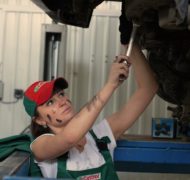Work as Members of One Another (Romans 12:4–8)
Bible Commentary / Produced by TOW Project
One essential practical application of walking in newness of life is to recognize how much we all depend on one another’s work. “For as in the body we have many members, and not all of the members have the same function, so we, who are many, are one body in Christ, and individually we are members one of another” (Rom. 12:4–5). This interdependence is not a weakness, but a gift from God. As we are being saved by God, we become more integrated with one another.
Paul applies this to the work that each of us does in our particular role. “We have gifts that differ” (Rom. 12:6a) he notes, and when he names a few of them, we see that they are forms of work: prophecy, ministry, teaching, exhortation, generosity, leadership, and compassion. Each of them is a “grace given to us” (Rom. 12:6b) that enables us to work for the good of the community.
Don’t Go it AloneSherron Watkins, recognized by Time magazine as one of the persons of the year for her whistle blowing in the Enron scandal, reflected on what she learned about taking a stand. She said, “In hindsight, I also wish that some of my peers had gone with me to meet with Ken Lay. Jordan Mintz was an in-house lawyer who was very concerned about this. I did not know that he had already taken these things to another law firm, and they had said they are very problematic. I did not know that Vince Kaminski had protested these things. So if I had just Vince and Jordan with me, the outcome might have been different…. If someone is in the unfortunate position where I was, I say don’t go it alone. I should have found a few more people to go with me because then they could not have dismissed me as one lone person.”[1] Ethix conversation, June 2007. |
Paul develops this process in the context of a specific community—the church. This is fitting because the entire letter revolves around a problem in the church—the conflict between Jewish and Gentile believers. But the list is not particularly “churchy.” All of them are equally applicable to work outside the church. Prophecy—”to proclaim a divinely imparted message” or “to bring light to something that is hidden”[2]—is the ability to apply God’s word to dark situations, something desperately needed in every workplace. Ministry—with its cognate “administration”—is the ability to organize work so that it does in fact serve those it’s supposed to serve, e.g., customers, citizens, or students. Another term for it is “management.” Teaching, exhortation (or “encouragement”), and leadership are obviously as applicable to secular settings as to church. So is generosity, when we remember that giving our time, our skills, our patience, or our expertise to assist others at work are all forms of generosity.
Compassion is a vastly underrated element of work. While we might be tempted to view compassion as a hindrance in the competitive world of work, it is actually essential for doing our work well. The value of our work comes not merely from putting in hours, but from caring about how our goods or services serve others—in other words, by compassion. Autoworkers who do not care whether their parts are put on properly are of no use to the company, customers, or co-workers, and will sooner or later be candidates for dismissal. Or if the auto company doesn’t care whether its workers care about its customers, the customers will soon enough switch to another brand. The exceptions to this are products and services that intentionally profit from customers’ weaknesses—addictive substances, pornography, products that play on fears about body image and the like. To make money in cases like this, it may be necessary not to have compassion for customers. The very fact that it’s possible to make money from harming customers in these fields suggests that Christians should try to avoid those workplaces in which compassion is not essential to success. Legitimate occupations make money from meeting people’s true needs, not from exploiting their weaknesses.
With all these gifts, the life-giving power of God is experienced in particular acts and ways of doing things. In other words, the power of God that enriches people’s lives comes through concrete actions taken by the followers of Jesus. God’s grace produces action in God’s people for the good of others.







